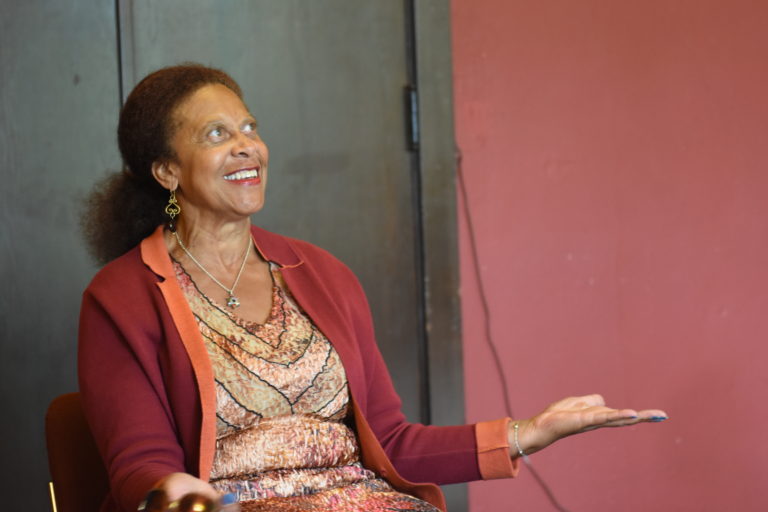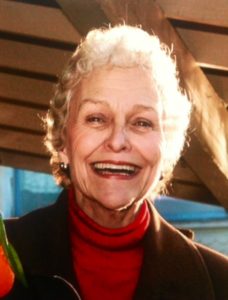Storytellers Spin True Tales About Life Under Trump
Oct 5, 2017
Posted in Arts and Culture

Stagebridge participant Beverly Miles: “Nobody ever sees the problem as the problem. IIt doesn’t have to do with Trump. It has to do with the (social) climate that we refused to change.
By Ken Epstein
The tumultuous administration of President Donald Trump caught many people by surprise. Unfolding events have rattled their daily lives and certainties like a strong earthquake, revealing hidden fault lines in how they relate to friends and relatives and causing reflections and reappraisals of values and priorities.
Seeing a need for people to reach out to express themselves and share their stories with others, longtime storytelling artist and teacher Jeanne Haynes has organized a class about the issues, “America Untold,” to help participants create short monologues about how these national and global changes intersect with their personal lives.
Hosted by Stagebridge, the class began Sept. 29 and continues weekly until Dec. 8. At the end of the sessions, the Marsh Theatre in Berkeley will feature an evening of on-stage performances of the artists’ pieces.
Stagebridge has been conducting classes for older adults in the performing arts since 1978. Haynes, who had spent her life working in journalism and public relations, took her first Stagebridge class 21years ago and found her passion.
“A small group of all women talked about storytelling,” she said. “My heart was just beating. I thought this is what I want to do.”
Since then, she has appeared on San Francisco Bay Area stages and as a featured storyteller for major events. Working with Stagebridge, she has taught the art form to over 4,000 local school children and more than 300 adults, as well as working as a private coach for several dozen advanced tellers.

In her introduction to America Untold, Haynes laid out her vision for the class.
“We will work on personal stories, stories based on interviews with people who have opposing views, and stories of community efforts to build bridges among us,” she said.
“While emotions can be expected to run high in such discussions, this will not be a time for rants or insults,” she said. “Civil discourse will be observed for active listening to differing opinions and the development of artfully told stories.”
At the first session last Friday, the 12 participants brainstormed some of their ideas about the issues and situations that could be incorporated into their performance pieces.
Beverley Miles, a retired university administrator, explained that her professional role “has always been to bring people together.”
“Nobody ever sees the problem as the problem,” she said. “It doesn’t have to do with Trump. It has to do with the (social) climate that we refused to change. We don’t want to see the personal responsibility that we have.”
Theresa Nervis talked about how she began to pay attention to what was going on.
“My husband was upstairs, and he was yelling at the TV. He said: ‘You should see this,’” she said.
“It’s time for me now to really look at this thing and what’s happening, “Nervis said. “There were 24 tweets about the NFL and four about Puerto Rico,” referring to the president’s public statements about events in the last few weeks.
Jeff Hanson, a portfolio manager for private families around the country, views the national conflict “as a battle between the bicoastal bubbles and the rest of the country. And I wonder which side is going to win.”
Harry Santi, a lifelong Oakland resident, has always cared about animals. He works as a docent at the Oakland Zoo.
“If Trump had his way, he would do away with the Endangered Species Act, which would really be terrible, said Santi.
Santi said he wants people to understand the connections between the survival of humans and animals.
Sarah Strong, a psychologist, has a brother-in-law who plays golf with Trump at Mar-a-Lago, the president’s resort in Palm Beach, Fla. She also has a son who belongs to a gay synagogue and fears they might be attacked.
“The same consciousness that led to Hitler is alive and well in the United States,” she said.
Samir Saad, who came to the United States from Egypt at the age of 19, said he had a friend who told him there was “no way the establishment in Washington would let this guy be president.”
“After the election, I told him, ‘you lied to me,’” said Saad.
For more information about Stagebridge, go to www.stagebridge.org/
To learn more about storyteller Jeanne Haynes, visit http://jeannehaynes.com/